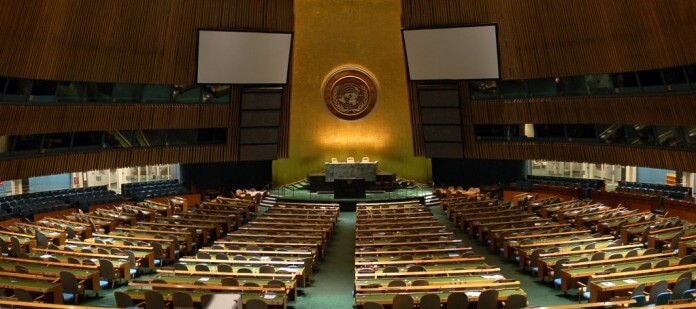The United Nations General Assembly's (UNGA) First Committee declared Monday that Israel must dispose of all its nuclear weapons and place its nuclear sites under the International Atomic Energy Agency's (IAEA) purview.
The 152-5 vote surprised many, given the vote was aimed at Israel, which has never admitted to possessing nuclear weapons, and not at its archenemy, the Islamic Republic of Iran.
According to reports, nations including Canada, Israel, Micronesia, Palau, and the United States opposed Friday's resolution on the "risk of nuclear proliferation in the Middle East."
Twenty-four other countries abstained, including members of the European Union (EU), Belgium, Australia, Romania, United Kingdom (UK), Georgia, Germany, Cameroon, and Czechia.
The annual resolution submitted by Egypt to the UNGA in New York was sponsored by the Palestinian Authority (PA) and several other countries, including Arab states including Bahrain, Jordan, Morocco, and the United Arab Emirates (UAE), which have all signed peace accords with Israel. The resolution targets Israel, which is believed to be one of only nine nations to possess nuclear weapons. The Israeli government has never officially admitted to possessing such weapons.
The resolution noted that the Jewish state is the only country in the Middle East and one of the few among the UN'S 193 member states which have not signed the Non-Proliferation of Nuclear Weapons Treaty (NPT).
Among the nations that voted against Israel was the Islamic Republic of Iran, a nation believed to be on the path to developing nuclear weapons. Despite its atomic program activities, the resolution did not mention Iran or condemn its violation of the 2015 nuclear accord.
The resolution calls on Israel to "accede to the Treaty without further delay, not to develop, produce, test or otherwise acquire nuclear weapons, to renounce possession of nuclear weapons and to place all its unsafe guarded nuclear facilities under the full scope of Agency safeguards as an important confidence-building measure among all States of the region and as a step toward enhancing peace and security."
The resolution was one of several that the UN's First Committee approved before a final vote in the UNGA plenum.
Last week, the First Committee also approved with 170 votes - including
Iran- a call for a nuclear-free zone in the Middle East. Israel was the only country that opposed the text, and several other countries abstained, including the U.S., Cameron, Comoros, and Tanzania.
According to Israeli officials at the UN, the NPT is only as relevant as the level of compliance and is not a remedy for the "unique security challenges" of the Middle East.
The Islamic Republic of Iran has been "rapidly advancing its illicit nuclear programs and currently possess large quantities of highly enriched nuclear material," said Israeli deputy ambassador to the UN, Michal Maayan.
Maayan also noted the existence of "undeclared nuclear activities in Syria remains relevant and worrisome, as well as the open questions related to the nature and operational state of the specific sites and materials within Syria."
The issue of nuclear weapons in the Middle East has long been a concern for the state of Israel, given the growing nuclear ambitions of the Islamic regime.
For the past few years, Israel and Iran have engaged in a cat-and-mouse fight over Tehran's nuclear program, with Israeli intelligence agencies revealing top-secret information about Iranian centrifuges and uranium enrichment.
The Israeli government continues to warn the world of Iran's nuclear activities, calling on the U.S. and other Western nations to cease negotiations with the regime and enact sanctions to prevent the mullahs from acquiring atomic weapons.









